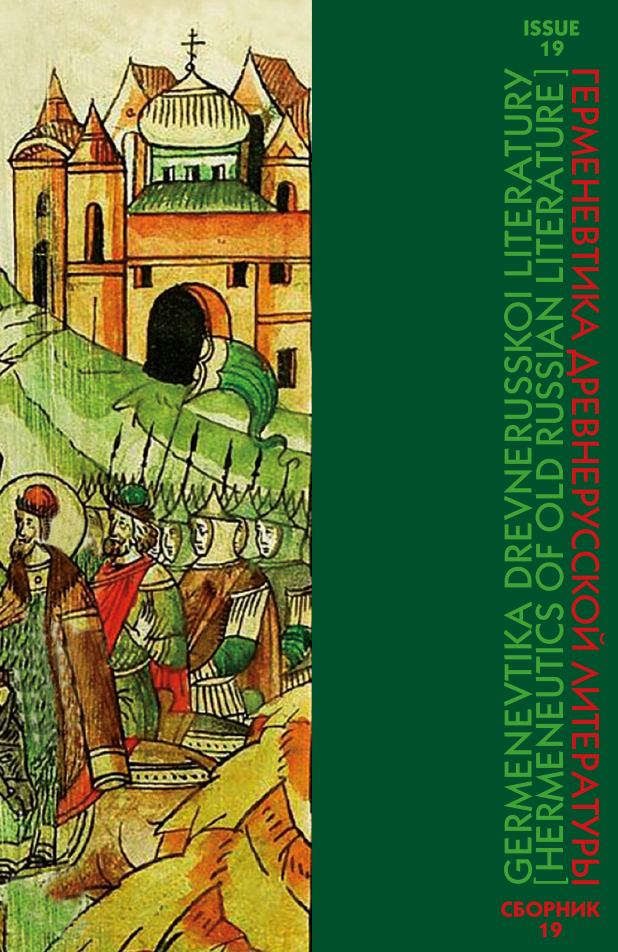Abstract:
The article examines the directions for further research of The Legend of Magmet-Saltan by Ivan Peresvetov. First of all, the portraits of the rulers portrayed by Ivan Peresvetov, Turkish ruler Magmet-Saltan and Byzantine king Constantine VIII Palaeologus, require study. An interesting, but unfortunately not fully developed, notice by Andrey V. Karavashkin on Ivan Peresvetov’s disclosure through the speeches of sultan-philosopher of the doctrine of a king as the image of God. The observation corresponds to the mood of era. In The Legend of Magmet-Saltan one should also pay attention to the perceptions of Byzantium and Turkey, which are revealed, among other things, through the images of the rulers. Ivan Peresvetov appeals to the historical experience of these two powers. All the mentioned aspects of further study of The Legend of Magmet-Saltan open one more problem — the problem of determining the genre features of the work. A.V. Karavashkin notes that Ivan Peresvetov “chooses the form of prophetic revelation” and his project of reforms is composed in line with an utopian thought of the early 16th century. In general, however, it is clear that I. Peresvetov raises the most acute problems of Russian reality. He offers lessons from Turkish ruler, which should be learned from the fall of Byzantium Russian tsar to stand him at the head of Christian Orthodox world. The thesis, according to I. Peresvetov, was the last hope of Orthodox Christians. It was not on building a heavenly kingdom, but on “transferring the empire,” which for I. Peresvetov meant above all “transferring justice.”
REFERENCES
1 Avaliani, S.L. “Ob Ivane Peresvetove” [“On Ivan Peresvetov”]. Trudy chetyrnadtsatogo arkheologicheskogo s≫ezda v Chernigove 1909 [Proceedings of the Fourteenth Archaeological
Congress in Chernigov 1909], vol. 3, 1911, pp. 111–112. (In Russian)
2 Al’shits, D.N. Ot legend k faktam [From Legends to Facts]. St. Petersburg, Nauka Publ., 2009. 498 p. (In Russian)
3 Sinitsyna, N.V., editor. Vse narody edino sut’ [All Nations Are United]. Moscow, Molodaia gvardiia Publ., 1987. 692 p. (In Russian)
4 Demin, A.S. “Malaia khudozhestvennaia forma kak problema istoricheskoi poetiki” [“Small Art Form as a Problem of Historical Poetics”]. Istoricheskaia poetika: Itogi i perspektivy izucheniia [Historical Poetics: Outcomes and Prospects of Study]. Moscow, Nauka Publ., 1986, pp. 210–235. (In Russian)
5 Demin, A.S. Russkaia literatura vtoroi poloviny XVII — nachala XVIII veka [Russian Literature of the Second Half of the 17th and the early 18th Centuries]. Moscow, Nauka Publ., 1977. 296 p. (In Russian)
6 Erusalimskii, K.Iu. “Grecheskaia ‘vera’, turetskaia ‘pravda’, russkoe ‘tsarstvo’: eshche raz ob Ivane Peresvetove i ego proekte reform” [“Greek ‘Faith’, Turkish ‘Truth’, Russian ‘Kingdom’: More about Ivan Peresvetov and His Project of Reforms”]. Vestnik RSUH. Seriia: Literaturovedenie. Iazykoznanie. Kul’turologiia, no. 7(69), 2011, pp. 87–104. (In Russian)
7 Zimin, A.A. Peresvetov i ego sovremenniki [Peresvetov and His Contemporaries]. Moscow, Nauka Publ., 1958. 500 p. (In Russian)
8 Karavashkin, A.V. Literaturnyi obychai Drevnei Rusi (XI–XVI vv.) [Literary Custom of Old Russia (11th–16th Centuries)]. Moscow, ROSSPEN Publ., 2011. 720 p. (In Russian)
9 Karavashkin, A.V. Russkaia srednevekovaia publitsistika: Ivan Peresvetov, Ivan Groznyi, Andrei Kurbskii [Russian Medieval Publicism: Ivan Peresvetov, Ivan the Terrible, Andrei Kurbsky]. Moscow, Prometei Publ., 2000. 418 p. (In Russian)
10 Karamzin, N.M. Istoriia gosudarstva Rossiiskogo [History of the Russian State], vol. 9. St. Petersburg, Tipografiia N. Grecha: izhdiveniem brat’ev Sleninykh Publ., 1821. 770 p. (In Russian)
11 Kas’ianenko, V.V. “Politicheskie idei I.S. Peresvetova: istoriografiia problem” [“I.S. Peresvetov’s Political Ideas: Historiography of the Problem”]. Tendentsii razvitiia nauki i obrazovaniia [Trends in the Development of Science and Education], no. 1 (40), 2018, p. 23–26. (In Russian)
12 Pervushin, M.V. “Dva vzgliada na kniaginiu Ol’gu v drevnerusskoi gimnografii” [“Two Views on Princess Olga in Old Russian Hymnography”]. Litera, no. 10, 2020. Available at: https://nbpublish.com/library_read_article.php?id=33861 (Accessed 14 May 2022). (In Russian)
13 Pervushin, M.V. “Neskol’ko vzgliadov na odnu zhizn’: literaturnye obrazy kniazia Vsevoloda Pskovskogo” [“Several Views on One Life: the Literary Image of Prince Vsevolod of Pskov”]. Germenevtika drevnerusskoi literatury [Hermeneutics of Old Russian Literature]. Issue 19. Ed.-in-chief O.A. Tufanova. Moscow, IWL RAS Publ., 2020, pp. 507–525. (In Russian) DOI: 10.22455/978-5-9208-0610-9-507-525
14 Polosin, I.I. “O chelobitnykh Peresvetova” [“On Peresvetov’s Petitions”]. Uchenye zapiski Moskovskogo gosudarstvennogo pedagogicheskogo instituta im. V. I. Lenina [Scientific Notes of the V.I. Lenin Moscow State Pedagogical Institute], vol. XXXV, part 2, 1946, pp. 25–55. (In Russian)
15 Rzhiga, V.F. I. S. Peresvetov publitsist XVI veka [Peresvetov is the Sixteenth Century Publicist]. Moscow, Sinodal’naia tipografiia Publ., 1908. 84 p. (In Russian)
16 Solov’ev, S.M. Istoriia Rossii s drevneishikh vremen [History of Russia since ancient times], vol. 6. Moscow, izdatel’stvo sotsial’no-ekonomicheskoi literatury Publ., 1960. 818 p. (In Russian)
17 Talmazan, O.N. “Pravda Peresvetova i pragma Makiavelli” [“Peresvetov’s Truth and Machiavelli’s Pragma”]. Slavianskie chteniia [Slavonic Readings], no. 16–17, 2020–2021, pp. 156–175. (In Russian)
18 Tynianov, Iu.N. Poetika. Istoriia literatury. Kino [Poetics. History of Literature. The Cinema]. Moscow, Nauka Publ., 1977. 576 p. (In Russian)
19 Khudiakov, M.G. Ocherki po istorii Kazanskogo khanstva [Essays on the History of Kazan Khanate]. Moscow, INSAN, Sovet po sokhraneniiu i razvitiiu kul’tur malykh narodov, SFK Publ., 1991. 320 p. (In Russian)
20 Iurganov, A.L. Kategorii russkoi srednevekovoi kul’tury [Categories of Russian Medieval Culture]. Moscow, MIROS Publ., 1998. 448 p. (In Russian)
21 Koselleck, Reinhart. The Practice of Conceptual History: Timing History, Spacing Concepts, trans. Todd Samuel Presner et al. Stanford, California, Stanford University Press, 2002. 363 p. (In English)
22 Mureçan, Dan Ioan. “Penser Byzance à l’aube de la Russie impériale. D’Ivan Peresvetov à Ivan IV Vasil’evic.” Istina, vol. LII, 2007, pp. 466–479. (In French)
23 Roemer, Mildred Allison. “Paradise Transformed: Varieties of Nineteenth- Century Utopias.” The Cambridge Companion to Utopian Literature, ed. Claeys G. Cambridge University Press, 2010, pp. 79–106. (In English)






